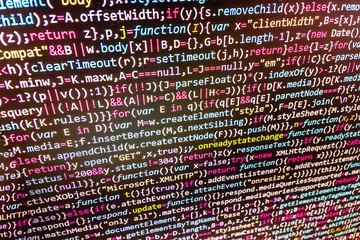
PUBLISHER'S NOTE: Artificial intelligence, once the stuff of science fiction, has become all to real in our modern society - especially in the American criminal justice system; As the ACLU's Lee Rowland puts it: "Today, artificial intelligence. It's everywhere — in our homes, in our cars, our offices, and of course online. So maybe it should come as no surprise that government decisions are also being outsourced to computer code. In one Pennsylvania county, for example, child and family services uses digital tools to assess the likelihood that a child is at risk of abuse. Los Angeles contracts with the data giant Palantir to engage in predictive policing, in which algorithms identify residents who might commit future crimes. Local police departments are buying Amazon's facial recognition tool, which can automatically identify people as they go about their lives in public." The algorithm is finding its place deeper and deeper in the nation's courtrooms on what used to be exclusive decisions of judges such as bail and even the sentence to be imposed. I am pleased to see that a dialogue has begun on the effect that increasing use of these logarithms in our criminal justice systems is having on our society and on the quality of decision-making inside courtrooms. As Lee Rowland asks about this brave new world, "What does all this mean for our civil liberties and how do we exercise oversight of an algorithm?" In view of the importance of these issues - and the increasing use of artificial intelligence by countries for surveillance of their citizens - it's time for yet another technology series on The Charles Smith Blog focusing on the impact of science on society and criminal justice. Up to now I have been identifying the appearance of these technologies. Now at last I can report on the realization that some of them may be two-edged swords - and on growing pushback.
Harold Levy: Publisher; The Charles Smith Blog:
------------------------------------------------------------
PASSAGE OF THE DAY: "By taking a seat at the research table, law enforcement can help shift the academic research focus to the immediate issues facing policing: issues such as how to accomplish de-escalation without a subject becoming violent, how best to police persons affected by mental illness, or how to conduct effective proactive crime reduction activities without harming community-police relations. The policing field needs constructive, forward-looking research that addresses how to police better, as opposed to research that simply points out what is being done wrong."
COMMENTARY: "Creating a seat at the research table," by Guest Blogger Sergeant Greg Stewart, of the Portland Police Bureau, in Oregon, published by the International Association of Chiefs of police Blog on July 17, 2018. (Thanks to The International Association of Chiefs of Police and The IACP Blog for allowing publication of excerpts of the following post - and the progressive evidence-based thinking it reflects . A link to the entire post can be found below.)
GIST:"There is an ongoing debate about the role of data, research, and science in policing. While many officers believe that policing is an art, there is an increased call from the public, politicians, policing leaders, and others for the profession to become more data-driven and scientific. Both views have merit, but it is inarguable that with increased access to stops data, use of force data, big data, and social network analysis, as well as the growing traction of predictive policing and evidence-based policing, police work is becoming subject to the tools of science. Understanding and addressing this fact is essential if police officers are to help inform and steer the direction of research and the study of their profession. Practitioner Research: Why Bother? Currently, the majority of police research is about police, rather than for police. Research on police tends to emphasize the things police are doing right or what they are doing wrong. However, this type of research does not always tell police how to do things better. From mental health to homelessness, the police have inherited many of society's problems. It's time to start researching the solutions.The lack of research conducted for police is a direct result of our profession's hesitancy to engage in the research process. Without active police participation, researchers start by conducting research about policing, rather than research that will necessarily be relevant and useful to departments. Academia's professional structure rewards the production of scientific articles over more accessible material, and officers lack incentives to value or pursue research as well, because research is not seen as integral to policing. This leads to a disconnect between the policing research and the policing profession.By taking a seat at the research table, law enforcement can help shift the academic research focus to the immediate issues facing policing: issues such as how to accomplish de-escalation without a subject becoming violent, how best to police persons affected by mental illness, or how to conduct effective proactive crime reduction activities without harming community-police relations. The policing field needs constructive, forward-looking research that addresses how to police better, as opposed to research that simply points out what is being done wrong."
GIST:"There is an ongoing debate about the role of data, research, and science in policing. While many officers believe that policing is an art, there is an increased call from the public, politicians, policing leaders, and others for the profession to become more data-driven and scientific. Both views have merit, but it is inarguable that with increased access to stops data, use of force data, big data, and social network analysis, as well as the growing traction of predictive policing and evidence-based policing, police work is becoming subject to the tools of science. Understanding and addressing this fact is essential if police officers are to help inform and steer the direction of research and the study of their profession. Practitioner Research: Why Bother? Currently, the majority of police research is about police, rather than for police. Research on police tends to emphasize the things police are doing right or what they are doing wrong. However, this type of research does not always tell police how to do things better. From mental health to homelessness, the police have inherited many of society's problems. It's time to start researching the solutions.The lack of research conducted for police is a direct result of our profession's hesitancy to engage in the research process. Without active police participation, researchers start by conducting research about policing, rather than research that will necessarily be relevant and useful to departments. Academia's professional structure rewards the production of scientific articles over more accessible material, and officers lack incentives to value or pursue research as well, because research is not seen as integral to policing. This leads to a disconnect between the policing research and the policing profession.By taking a seat at the research table, law enforcement can help shift the academic research focus to the immediate issues facing policing: issues such as how to accomplish de-escalation without a subject becoming violent, how best to police persons affected by mental illness, or how to conduct effective proactive crime reduction activities without harming community-police relations. The policing field needs constructive, forward-looking research that addresses how to police better, as opposed to research that simply points out what is being done wrong."
----------------------------------------------------
- The entire commentary can be read at the link below:

PUBLISHER'S NOTE: I am monitoring this case/issue. Keep your eye on the Charles Smith Blog for reports on developments. The Toronto Star, my previous employer for more than twenty incredible years, has put considerable effort into exposing the harm caused by Dr. Charles Smith and his protectors - and into pushing for reform of Ontario's forensic pediatric pathology system. The Star has a "topic" section which focuses on recent stories related to Dr. Charles Smith. It can be found at: http://www.thestar.com/topic/
Harold Levy: Publisher; The Charles Smith Blog;
---------------------------------------------------------------------
